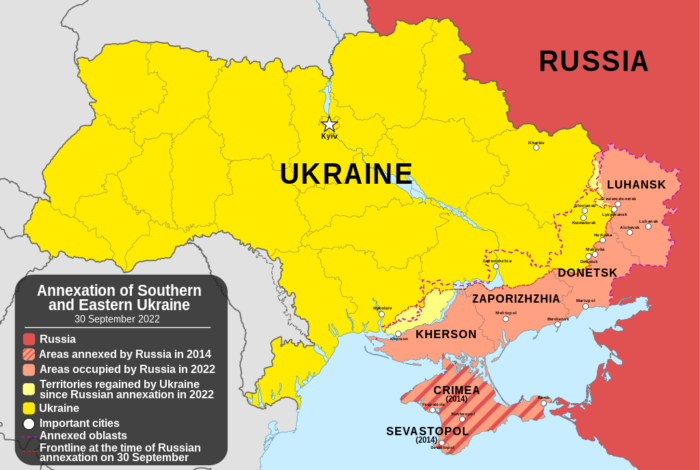The software industry plays a large role in Ukraine’s economy, with many Ukrainian developers working remotely from Ukraine for software vendors located in the EU, UK, and US. Training manuals in the Ukrainian language will help veterans of Ukraine’s military struggles against Russia take advantage of this opportunity.

While the weapons of war that Western nations have been supplying Ukraine are helping the Ukrainians hold onto their country, guns are not all that’s needed. For one thing, career training for military veterans and others whose lives have been upended by the country’s war with Russia is an area Ukrainians are addressing, and they’re getting help from open-source organizations.
At the end of October at KubeCon in Detroit, the Linux Foundation and the Cloud Native Computing Foundation announced they were going to help make three of the Linux Foundation’s training courses available in the Ukrainian language. The process of translating the courses was handled surprisingly quickly, and by mid-February CNCF was able to announce that the courses were available.
“We’re speaking about courses primarily for beginners,” Ihor Dvoretskyi, a developer advocate for CNCF who’s based in Ukraine, told me shortly after the availability of the translations was announced. “Intro to Linux, for example, covers one of the technologies that you have to have to have some knowledge about if you’re just getting started with tech.”
The effort is the result of a partnership with Razom for Ukraine (Razom means “unity” or “together” in Ukrainian), a non-profit organization founded in 2014 as a pro-democracy organization that’s been playing a major role supporting Ukrainians affected by the country’s war with Russia. The partnership is part of the organization’s Project Veteranius, which aims to help Ukrainian veterans secure jobs. The programs it offers include technical skillset development, hands-on projects, mentorship opportunities, and psychological support.
In addition to Introduction to Linux; Git for Distributed Software Development and Introduction to Kubernetes have been translated.
Why Ukraine Needs Tech Training
According to Dvoretskyi, having coursework available in the Ukrainian language is essential
“Many people may speak English here in Ukraine, but unfortunately not all of them speak and understand English proficiently enough to understand the course content, especially when tech terminology is included,” he said. “By making these courses available in Ukrainian, we are making it open for a wider public.”
He explained that Project Veteranius’s focus on Ukrainian veterans — and on giving them tech skills — is not a direct response to Russia’s invasion of Ukraine, but dates back to Russia’s takeover of Crimea nearly a decade ago.
“We’re not only speaking about the current full-scale war that’s happening in Ukraine; the war between Ukraine and Russia has been happening since 2014,” he said. “We had many people who’d been injured or who had some unfortunate circumstances in their life that had to adapt to their new life. If you are looking for new opportunities in your career, high-tech is probably one of the best areas where you can get started. It’s super interesting, it’s kind of like the next future for many people, and it’s also well-paid.”
Although career training has been a major mandate for Veteranius since it got started, it’s only been in the past year or so that the project has focused on making training available online.
“In the past, Veteranius was mostly face-to-face stuff in smaller groups, where people in different cities of Ukraine work in classes with a physical instructor,” Dvoretskyi said. “This time around, we’re making it more widely available.”
The manuals are hosted online by the Prometheus platform (not to be confused with CNCF’s Prometheus project), a Ukraine-focused educational platform that makes available educational course material from outside the country that’s been translated into Ukrainian. Typically, the platform charges for access to the data it hosts and uses those payments to purchase and translate additional educational materials. Some material, however, it makes available for free, as it’s doing with the manuals from the Linux Foundation.
The Linux Foundation manuals are available to everyone, regardless of their status as veterans or whether they live in Ukraine or elsewhere.
Coding During Wartime
Before the war, software development played a major role in Ukraine’s economy, and its importance has likely grown since Russia’s invasion. Ukraine-based software vendors have not only been able to continue to operate and bring much-needed foreign capital into the country, they’re also a source of well-paying jobs. This includes not only people who have remained in the country during the war, but those who have fled the country as refugees to take temporary residence in other European countries who can continue to work remotely in their new host country.
As soon as it became apparent that the invasion wasn’t going to be a two-day cakewalk for the Russians, software projects with employees in Ukraine were scrambling to assist their colleagues who suddenly found themselves living in a war zone. While a few of these organizations were located in Ukraine, the majority were businesses and non-profits headquartered in the EU, the UK, and the US.
CloudLinux belongs to the second category. It’s an open-source company headquartered in Palo Alto that develops an eponymous security-hardened clone of Red Hat Enterprise Linux that’s been modified to meet specific needs of the hosting industry. When Russia’s invasion began, a considerable portion of the company’s workforce was located in Ukraine and Russia, which isn’t surprising, since the company’s founder and CEO, Igor Seletskiy, and his wife are originally from Odesa.
“I’m a Russian-speaking Ukrainian, so it was fairly natural for me to hire a lot of people in those locations,” Seletskiy told me in April 2022, exactly eight weeks after Russia’s invasion had begun. By then, Russia’s initial attempt to take Kyiv had failed and Putin had moved his troops away from the city’s suburbs. “We were diverse enough that about half of our people were outside of the affected region, but we had half of our people in the region once the war hit. We still have some people in Russia, but very few. We have significantly more people in Ukraine.”
Seletskiy said that the reason that the company had fewer people working from within Russia eight weeks after the war started was due to the large exodus from Russia when the war began.
“People in Ukraine cannot leave the country because of the mobilization. It’s illegal for them to leave the country.” he said.
“There is a lot of suffering going on,” he added. “There is suffering by people who are staying in Ukraine, and there is suffering for people who were able to leave the country, because now they’ve emigrated their heart is with their families who weren’t able to emigrate.”
Those first months when Russian troops were positioned close to Kyiv were heartbreaking, Seletskiy said. He spoke of being in online meetings with employees in Kyiv that were interrupted by the sound of sirens, which prompted participants to abandon the meeting to seek shelter. He also talked about employees whose lives were further uprooted when their houses were destroyed by shelling.
“It’s not houses that they worry about — houses are just houses,” he said. “They worry about all their neighbors that are still there, because if their houses are destroyed their neighbor’s houses are destroyed.”
Amazingly, during those early days there were very few people who were unable to work due to a lack of internet.
“I have more than 40 people in Ukraine right now,” he said. “There are actually just three people who cannot work, and two of them are actually fighting the war — they took up guns and they’re fighting the Russian army. There is only one person who is having intermittent connectivity issues. Everyone else is able to work.”
Seletskiy said that some employees were continuing to work from Russian-controlled areas in the Donbas region in Southeastern Ukraine, although the company had to find workarounds for paying them due to the economic sanctions against Russia that were imposed at the beginning of the war.
The War’s Effect on Ukraine Software Vendors
A week or so after I talked with Seletskiy, I had a conversation with Hanna Ustynova, communications manager at Headway, a four-year-old EdTech startup, along with Alex Vorona, the company’s COO. At the time of our talk the company, which markets a proprietary mobile app with more than 12 million downloads, was headquartered in Ukraine. It has since moved to London, although a large part of its workforce is still in Ukraine.
Initially, most of Headway’s employees worked out of the company’s office in Kyiv, but the company developed a more remote-focused approach during the Covid-19 pandemic. Ironically, that ended up being an advantage for the company after the Russian invasion.
“I would say it’s helped us very much to have the proper processes in place, which allows us to switch between working in our offices and working from home,” Vorona said. “We now use a hybrid scheme where people both work remotely and in offices or hubs.”
He said that when the war broke out and Kyiv was under direct attack, one of the most important challenges the company faced was moving employees out of harm’s way.
“When the war started, it was our main goal to bring our people to safety,” he said. “In three days we managed to evacuate 95% of our employees and their relatives from Kyiv to western parts of the country which are deemed to be relatively safe. I would say that’s a very powerful stress test for every business, because when you move hundreds of people through a country that is in chaos due to the war it’s a unique experience I hope you will never face.”
Because the company already had a remote process in place, it was also able to accommodate employees who chose to leave Ukraine to live in nearby Poland or elsewhere for the duration of the war. This group would primarily consist of women and their children, because of the requirement that kept most men in Ukraine to help with the defense effort.
Vorona said that the help the company was able to offer included assistance on both sides of the border with Poland.
“While still in Ukraine, we provided shelter,” he said. “We rented hotels in western parts of Ukraine, which is the main touristic part of the country so there are plenty of facilities, and then gradually we transferred them to Warsaw. In Warsaw, we also have the people to accommodate them.”
Planning was made easier, Vorona said, by the fact that they had an employee who lived in Western Ukraine who was able to make preparations, such as arranging for rooms at a local hotel at a time when there was a mass migration into the region, making rooms in short supply. “We almost rented the whole hotel for our people,” he said.
Making travel plans was the biggest logistic hurdle for the Headway team because in the early days of the war, many roads were closed and the roads that were open couldn’t handle the traffic of thousands of automobiles filled with families seeking safety that were taking them, which brought traffic to a standstill. This meant that places to shelter along the way were needed as well.
Gasoline scarcity was also a problem, according to Vorona.
“When all the country moves fast, the result is a huge supply deficit, with hours-long queues to get gas, and not all gas stations had fuel,” he said. “It took effort to find the proper routes with fuel with no risk of coming under bombardment.
“It was impressive,” he added. “I suppose that for the first three days of the war, if we slept six or seven hours in total, it would have considered that great.”
Similar to what we’ve been hearing from others in Ukraine who have gone through nearly the same, Vorona thinks the startup emerged from the ordeal as a stronger company.
“After this event, I believe we can manage any crisis our business can face, because business and commercial crises are incomparable to the challenges you face during wartime.”
Christine Hall has been a journalist since 1971. In 2001, she began writing a weekly consumer computer column and started covering Linux and FOSS in 2002 after making the switch to GNU/Linux. Follow her on Twitter: @BrideOfLinux











